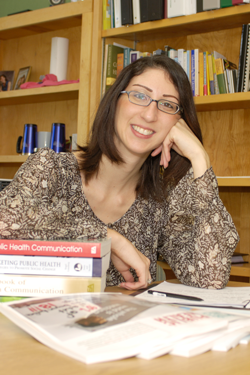Journalism, public health faculty to address ways to involve more rural residents in clinical trial research programs
December 2, 2010

Dr. Daniela Friedman of the Arnold School is
collaborating with faculty from USC's
School of Journalism and Mass
Communications on a study aimed at making
clinical trials more accessible to people living
in rural South Carolina.
A study by three University of South Carolina faculty members, including Dr. Daniela Friedman of the Arnold School, is being launched to increase awareness and improve communication about clinical trials research for rural South Carolinians.
"Enrollment in clinical trials is particularly low in rural areas, making the underserved population largely underrepresented in medical research." said Dr. Sei-Hill Kim, an associate professor in USC's School of Journalism and Mass Communications and principal investigator of the study.
"This disparity in participation may pose a public health problem because these cutting-edge techniques in prevention and therapy are not equally accessible or utilized by those who experience the highest disease incidence," Kim said.
Friedman and Dr. Andrea Tanner, an associate professor in the journalism school, are co-principal investigators. In their proposal for funding, the researchers noted that 39.5 percent of South Carolina's residents live in rural areas, compared to 21 percent nationally.
"It has long been demonstrated that rural citizens experience significant health disparities, with factors such as limited access to health care services, lower rates of health insurance, lower socioeconomic and educational status, and cultural and social differences contributing to these disparities," Kim said.
The study has three key aims:
- Examine the current state of clinical trials in the state and determine to what degree rural residents are represented in state clinical trials.
- Assess rural adults' current knowledge and beliefs about clinical trials.
- Analyze current communication messages and channels being used to recruit and educate residents about clinical trials.
"Findings from this study will be necessary for the future development and assessment of a pilot education program about clinical trials in rural South Carolina," said Friedman, an assistant professor in the Arnold School's Department of Health Promotion, Education, and Behavior.
"Our research will have tremendous value in educating clinical trial investigators, potential trial participants, and rural physicians who could serve as partners in the recruitment and education process."
The research team and their clinical and community partners will "develop specific recommendations for effective communication and innovative education about clinical trials and research participation opportunities," she said.
Kim, Tanner and Friedman are members of the Science and Health Communication Research Group, a multidisciplinary effort spearheaded by the School of Journalism and Mass Communications.
Dr. Amy Brock-Martin, research assistant professor in Health Services, Policy, and Management and deputy director of the South Carolina Rural Health Research Center will serve in an advisory role on this project.
"This collaboration among researchers in public health and mass communication is good for our respective schools and good for the university," said Tanner. "By integrating different ideas, theoretical perspectives and applications, our research outcomes are stronger."
Support for the three-year study is coming from a $200,000 grant from Health Sciences South Carolina, a statewide biomedical research collaborative composed of six of the state's largest health systems and the state's largest research-intensive universities.



_01.jpg)
_02.jpg)